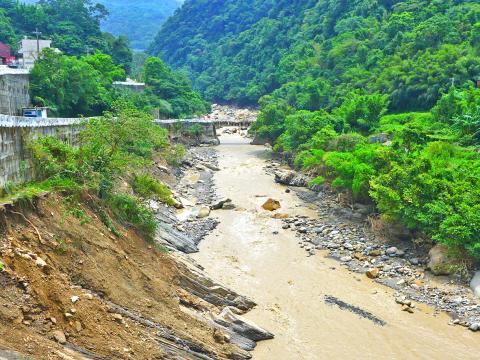Taipei Mayor Ko Wen-je (柯文哲) yesterday attributed the turbidity of tap water in areas of the city following Typhoon Soudelor to poor soil and water conservation efforts upstream of Nanshih River (南勢溪), saying that water transferred to purification plants had given rise to the problem.
The poor quality of tap water sparked waves of panic buying in Taipei and New Taipei cities over the weekend.
Asked whether the Taipei City Government had been slow to take action to address the tainted water, Ko said that the city government is not at fault, as it has carried out extensive soil and water protection measures along the Beishih River (北勢溪), which flows into the reservoir.

Photo: Lee Ya-wen, Taipei Times
“This is not the first time Taipei has been hit by a typhoon of this magnitude, but the city’s raw water turbidity surpassed 30,000 nephelometric turbidity units [NTU] over the weekend, indicating a problem,” Ko said.
The city would ask the central government to inspect areas upstream of the Nanshih River and make the necessary improvements to the city’s water supplies, he said.
Taipei Water Department Commissioner Chen Chin-hsiang (陳錦祥) said that no water had been supplied from Feitsui Reservoir (翡翠水庫) over the weekend, as city policy stipulates that water from Nanshih River be tapped first, and that water from the reservoir serve as a complement to cover the city’s water needs when necessary.
He said that as Nangshih River is governed by the Taipei Water Management Office, overseen by the Water Resources Agency, the city government can only offer the office suggestions on how to boost conservation efforts along the river.
He said the highest raw water turbidity the city had previously seen was 12,000 NTUs, recorded following Typhoon Soulik in 2013, which the department was then able to treat and continue the supply of clean water.
However, the department faced “great difficulty” treating contaminated water following Typhoon Soudelor, when water turbidity shot up from 10,000 NTUs at 7am on Saturday to 30,000 NTUs at 8am, forcing the departments in Chang Hsing, Gongguan and Jhihtan to limit water tapped from the Nanshih River, Chen said.
He said poor soil and water conservation measures led to numerous mudslides during Typhoon Soudelor, which likely contaminated water in the river, adding that access to New Taipei City’s Wulai District (烏來) — located downstream of the river — was still blocked as a result of mudslides as of press time last night.
Water quality was back to normal yesterday, with raw water and tap water turbidity dropping below 200 NTUs and 1 NTU respectively, Chen said.
However, Taipei Department of Health Secretary-General Hsu Chao-chen (許朝程) urged the public to boil water five minutes longer than they normally would over the next couple of days to eliminate the potentially pathogenic chloroform often associated with impurities in water.

Tropical Storm Gaemi strengthened into a typhoon at 2pm yesterday, and could make landfall in Yilan County tomorrow, the Central Weather Administration (CWA) said yesterday. The agency was scheduled to issue a sea warning at 11:30pm yesterday, and could issue a land warning later today. Gaemi was moving north-northwest at 4kph, carrying maximum sustained winds near its center of up to 118.8kph and gusts of 154.8kph. The circumference is forecast to reach eastern Taiwan tomorrow morning, with the center making landfall in Yilan County later that night before departing from the north coast, CWA weather forecaster Kuan Shin-ping (官欣平) said yesterday. Uncertainty remains and

SEA WARNING LIKELY: The storm, named Gaemi, could become a moderate typhoon on Wednesday or Thursday, with the Taipei City Government preparing for flooding A tropical depression east of the Philippines developed into a tropical storm named Gaemi at 2pm yesterday, and was moving toward eastern Taiwan, the Central Weather Administration (CWA) said. Gaemi could begin to affect Taiwan proper on Tuesday, lasting until Friday, and could develop into a moderate typhoon on Wednesday or Thursday, it said. A sea warning for Gaemi could be issued as early as Tuesday morning, it added. Gaemi, the third tropical storm in the Pacific Ocean this typhoon season, is projected to begin moving northwest today, and be closest to Taiwan on Wednesday or Thursday, the agency said. Today, there would likely

DISRUPTIONS: The high-speed rail is to operate as normal, while several airlines either canceled flights or announced early departures or late arrivals Schools and offices in 15 cities and counties are to be closed today due to Typhoon Gaemi, local governments announced last night. The 15 are: Taipei, New Taipei City, Taoyuan, Tainan, Keelung, Hsinchu and Kaohsiung, as well as Yilan, Hualien, Hsinchu, Miaoli, Chiayi, Pingtung, Penghu and Lienchiang counties. People should brace for torrential rainfall brought by the storm, with its center forecast to make landfall on the east coast between tonight and tomorrow morning, the Central Weather Administration (CWA) said. The agency issued a sea warning for the typhoon at 11:30pm on Monday, followed by a land warning at 11:30am yesterday. As of

CASUALTY: A 70-year-old woman was killed by a falling tree in Kaohsiung as the premier warned all government agencies to remain on high alert for the next 24 hours Schools and offices nationwide are to be closed for a second day today as Typhoon Gaemi crosses over the nation, bringing torrential rain and whipping winds. Gaemi was forecast to make landfall late last night. From Tuesday night, its outer band brought substantial rainfall and strong winds to the nation. As of 6:15pm last night, the typhoon’s center was 20km southeast of Hualien County, Central Weather Administration (CWA) data showed. It was moving at 19kph and had a radius of 250km. As of 3pm yesterday, one woman had died, while 58 people were injured, the Central Emergency Operation Center said. The 70-year-old